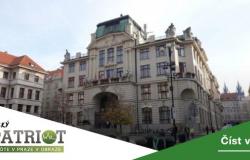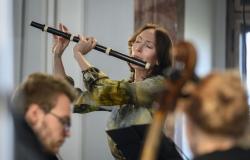
10 crowns more for radio, 25 crowns more for television. Representatives of the government of Petr Fiala (ODS) discussed the proposal of the Minister of Culture Martin Baxa (ODS) to increase fees for public media. In addition to the fee increase itself, the amendment to the Media Act is supposed to introduce a new payment model for legal entities and individuals. The opposition movements ANO and SPD propose that public media should be paid from the state budget.
All households and companies owning a television or radio receiver are obliged to pay the TV and radio fee. From next year, the television fee is to be raised by 25 crowns a month, the radio fee by 10. However, according to Martin Baxa, the coalition is still debating the exact amounts.
The spokeswoman for the Ministry of Culture, Ivana Awwadová, told Echo24 that the media amendment is being discussed with representatives of private radio and television broadcasting operators and with representatives of online publishers, particularly regarding the issue of defining public service in the field of radio and television broadcasting. The settlement of the comment procedure has not yet been completed.
“The bill abandons the model where legal entities and individual entrepreneurs pay fees for each receiver they own or use for business. In addition to the increase in fees, the amendment also proposes a new payment model for legal entities and natural persons doing business, which will be based on the number of employees. According to them, they determine the multiples of fees that legal entities and natural persons would pay. Variants of groups according to the number of employees are being discussed,” said Awwad, adding that everything should be settled “in a reasonable time.” The proposal that people who are connected to the Internet should also pay the fee is receiving criticism.
The government wants to protect independence
According to its first vice-chairman Jan Bartošek, the ruling KDU-ČSL supports the increase in fees for TV and radio for a long time. “I consider public media to be one of the pillars of democracy. The fact that ČT and CRo work well in our country also proves that they are the most unwatched and most listened to stations on the media market for a long time, which are also the most trusted according to surveys. If we were to switch to another type of financing, for example from the state budget, CT would lose its independence and thus its objectivity. In addition, the financial costs would still be borne by the taxpayer,” Bartošek told Echo24, referring to the alternative offered by the ANO and SPD movements, which would link public media to the state budget.
“To maintain the same good level, public media need stable and predictable funding. That’s why, as people, we have long supported the option on which an agreement was reached last September and which was also presented – for TV by 25 crowns a month and for radio by ten crowns a month,” added Bartošek.
TOP 09 and the STAN movement propose that the state values the fees regularly in the future – for example according to inflation. “For TOP 09, strong and independent public service media are one of the conditions for the functioning of democracy. That is why we advocate linking the amount of fees to economic indicators, such as inflation, so that the financing of public media is sustainable and predictable. It is absolutely a key priority of TOP 09, and in order to promote it, we are willing to support even a slightly lower increase in the fee this year than was originally announced,” TOP 09 head Markéta Pekarová Adamová told Echo24.
Her party member and the head of the TOP 09 parliamentary club, Jan Jakob, told Echo24 that thanks to the indexation, ČT and CRo will have an overview of what resources they will be able to count on in the future and, accordingly, “provide a public service without the influence of politicians”. “I imagine that a deal could be possible in a matter of weeks,” Jakob said.
The head of the Pirates, Ivan Bartoš, told Echo24 that the specific numbers of the increase will still be discussed by the government. “We need strong and independent public media that we as a society can lean on and trust. And that means ensuring their sustainable financing,” Bartoš pointed out.
“On behalf of the Pirates, we also negotiated in the coalition that the management of Czech Television and Czech Radio will be monitored by the Supreme Audit Office in order to ensure the greatest possible transparency. We will also discuss this with the opposition, as a constitutional majority is required for approval. We have a contradictory perception of the proposed expansion of the range of taxpayers, i.e. the obligation to pay a fee even for people who have the Internet but do not watch TV or radio on it. I believe that we will discuss the proposal as soon as possible in the government and subsequently in the Chamber of Deputies,” added Bartoš.
Media as a state subsidy organization
Czech Television reported that the opposition movements ANO and SPD want to link public service media to the state budget. “Looking at what is happening in Hungary, and currently also in Slovakia, we think this is the least we can do to make our society more resilient. Both opposition movements disagree with the plan of the government coalition. In the future, they want to cancel the fees and pay for the operation of the media from the state budget,” Pekarová Adamová, Speaker of the Chamber of Deputies, pointed out to Echo24 at the same time.
SPD spokeswoman Barbora Šťastná told Echo24 that the government’s proposal is unacceptable and the movement unequivocally disagrees with it. “In addition, television and radio fees are not only to be increased, but also to be paid by the owners of all devices enabling the reception of public media broadcasts, mobile phones, tablets or computers. In this way, the number of radio and television concessionaires is to increase by 230,000. Such an enormous increase in the budgets of Czech Television and Czech Radio would also lead to a deepening of the imbalance in the media market,” said Šťastná.
“In the SPD movement, we are of the opinion that concession fees should be abolished completely and Czech Television and Czech Radio should be transformed into state-funded organizations with a budget fixed by law and with management controlled by the Supreme Audit Office,” added Šťastná.
Tags: government finalizes increase fees television radio opposition proposes nationalization
-




